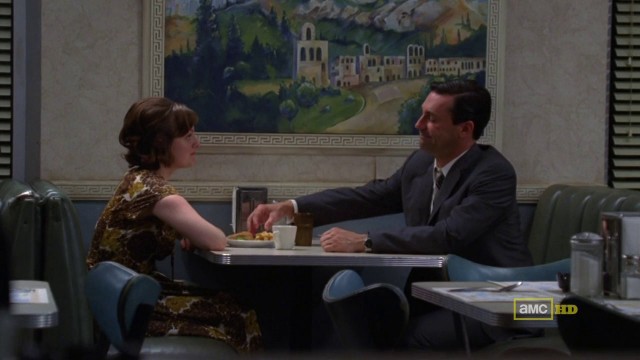To Get the Career You Want, Should You Assist Someone Who’s Already There?

Good for Peggy, right? Now think of all of Don’s secretaries who didn’t become Copy Chief.
I’ve done a lot of assisting, in my day.
One of my earliest preteen “jobs” was assisting my mom as she taught piano lessons. In grad school, I assisted directors — both part of my in-class work, and proto-professionally for the Illinois Shakespeare Festival — and after that I became an executive assistant at a think tank in DC. I’ve spent a solid six years assisting people.
And then I turned away from that and started looking to build a career on my own talents.
This is not to say that assisting doesn’t require talent. It does in fact require a lot of talent to be a helpful-but-unobtrusive assistant, and it is something that I didn’t really get good at until I started working at the think tank. (It didn’t help that my Director’s Assistant jobs were assigned without any defined responsibilities or tasks; I was mainly there to sit quietly until the director was inspired to find a way to use me. Some days I’d spend an eight-hour rehearsal just sitting quietly.)
But I was never under the presumption that my role as Executive Assistant to the President would eventually lead to me becoming the President. I knew that if this path lead anywhere, it was to a bigger Executive Assistant job at a bigger think tank. “Or,” as one mentor told me, “you could always do protocol.”
So I read Dissent Magazine’s “The Assistant Economy” with a mixture of amusement and skepticism:
Welcome to the main artery into creative or elite work — highly pressurized, poorly recompensed, sometimes exhilarating, sometimes menial secretarial assistance.
You can read the entire piece on your own, and although I don’t deny that there are a lot of people out there working as executive or personal assistants, and a lot of creative types and executives and entrepreneurs who hire assistants to help them with their workloads, I have trouble with the idea that this is the way to your own big creative/executive/entrepreneurial career.
Let me just lay it out to you straight, Billfolders: you do not get invited to contribute original work and ideas simply because you are skilled at pouring coffee or entering data into accounting software. While you are doing the assisting, someone else will walk in with a great idea and be invited to the Great Idea Table, and you will watch that and think “why not me? I have great ideas!”
And then you will answer the phone, because it is your job to answer the phone.
And then, if you’re me, you’ll go back to your apartment and think “I have great ideas. If I want to get a career where my ideas are the most important part of what I do, I need to find some kind of work where the ideas are the most important part of what I contribute.”
From the small sample size of “assistants I know:” some of them have moved up to bigger and better assisting gigs, and some of them have laterally transitioned into other types of jobs. Some of my MFA classmates who assisted directors did become directors themselves, so at least that system works, and there is always the “assistant to the novelist reveals the novel she’s been working on for the past two years” model.
But I fundamentally disagree with the idea that if you want to make it in the world of “creative or elite work,” you should go get a job as someone’s assistant. I’d argue that you should go figure out how to do the creative or elite work you want to do, and get someone to hire you based on your ideas and talent.
At least, that’s what worked for me.
Support The Billfold
The Billfold continues to exist thanks to support from our readers. Help us continue to do our work by making a monthly pledge on Patreon or a one-time-only contribution through PayPal.
Comments